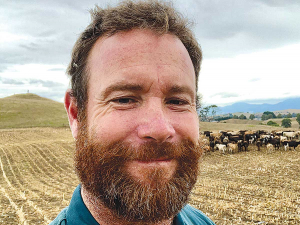Boost for NZ, Nordic Jerseys genetic link
A new collaboration is underway to improve the genetic links between the New Zealand and Nordic Jersey cattle populations.
 Ben Watson, dairy farmer and Jersey Advantage committee chair, farms 1,700 Jersey and Jersey X cows across three dairy farms in Walton and Piopio.
Ben Watson, dairy farmer and Jersey Advantage committee chair, farms 1,700 Jersey and Jersey X cows across three dairy farms in Walton and Piopio.
A farmer group promoting Jersey cows says stock and semen sales indicate the breed is on the rise.
Jersey Advantage chairman Ben Watson says the economic benefits of the Jersey breed are undeniable.
“We’re seeing the market respond to that.”
The group says it’s a sentiment that Ross Riddell, general manager of Link Livestock agrees with.
“Demand for Jersey herds and stock lines have been significantly ahead this season, and we’re getting good interest in surplus in-calf Jersey stock,” says Riddell.
“Prices for in-milk stock are at least as high as the other breeds but in many cases higher due to shortage in supply.
“The drought conditions in many areas may exacerbate the problem and push prices higher with farmers not in a feed position to carry surplus in-calf cows through to the end of the season for other farmers to purchase.”
LIC, who supply semen to around 80% of the industry, also experienced an increase in Jersey semen sales this season.
Jersey sales of LIC’s flagship AB product – Premier Sires – ended the season 2% ahead of last year at 14% while their frozen product was also up 2% to 21% of total frozen straws.
With increased demand for Jersey semen LIC have decided to extend their fresh sexed semen offering next season to include Jersey.
All this is good news for those wanting to get more Jersey genetics in their herd, says Watson.
“There’s long been acknowledgment of the ability for Jersey’s to convert feed into milksolids more efficiently than any other breed, and we’re seeing renewed interest in Jersey’s due to strong milkfat prices. All indications are that a VCR of parity to 1.2 is the new normal.”
“Increasingly farmers are also becoming aware of the breed difference in pregnancy rates. This spring the majority of Jersey herds are reporting non-pregnancy rates in the 7-12% range, whereas the typical Holstein Friesian herd is around 11-17%. This variation makes a significant difference to year-on-year replacement rates, farm carbon emissions and the cost of rearing young stock,” says Watson.
The Jersey breed also has the advantage when it comes to those wanting A2 animals. “Around 60% of the Jersey population carry the A2A2 gene, compared to 44% for Holstein Friesian and 53% for crossbreeds,” says Watson.
“It’s certainly something farmers should be thinking about when they make their breeding decisions next season.”
Keratin biomaterials company Keraplast and Wools of New Zealand have signed a new superpremium wool contract which is said to deliver a boost to wool growers.
While things are looking positive for the red meat sector in 2026, volatility in global trade remains a concern, says the Meat Industry Association (MIA).
The quest to find innovative practical, scientific solutions to deal with water-related issues at a catchment level has been the theme of an important conference at Massey University last week.
One of the country's top Māori farms faces a long and costly rebuild to get the property back to where it was before recent storms ripped through it.
The latest Global Dairy Trade auction results have delivered a boost to dairy farmers.
New Zealand potato growers are prioritising value creation from high yields to meet a complex mix of challenges and opportunities, says Potatoes NZ chief executive Kate Trufitt.